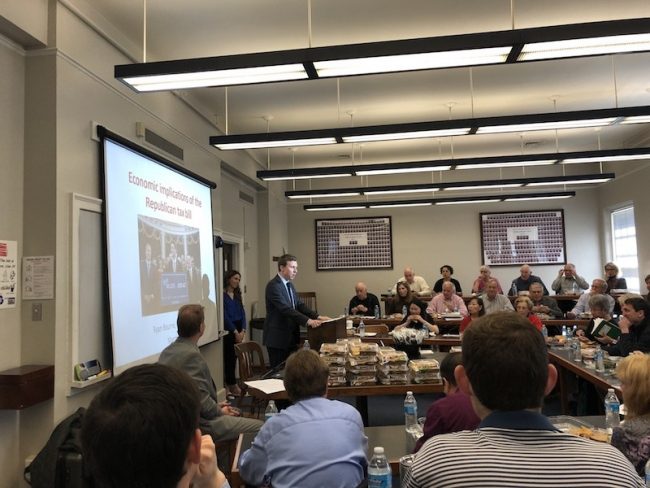An economist emphasized March 6 that the Republican tax bill will deliver financial benefits to the vast majority of taxpayers, but may have long term consequences.
Ryan Bourne is the R. Evan Scharf Chair for the Public Understanding of Economics at the Cato Institute, a public policy research organization. He delivered a lecture titled “Economic Implications of the Republican Tax Bill” to a group of about 50 in Florence Hall, where he aimed to cut through what he called the political bias of media outlets on the reform and focus on economic impacts.
The bill, which was passed in December, has a goal of lowering tax rates and generating investment. Bourne said that the direct financial impact on families is beneficial, because it cuts marginal tax rates on income. The bill also substantially lowers business taxation, cutting the corporate rate from 35 percent to 21 percent. Bourne stated that the U.S. economy will be larger than it would have been absent the reforms.
“I think there is good academic and theoretical evidence that the tax reforms delivered to increase the size of the economy somewhat,” Bourne said. “So far it’s too early to say how much investment will be generated as a result.”
Bourne said that although some media outlets have claimed that the new tax code has already generated national investment, it is too soon to tell. He said that some reports include bonuses and share buyback data, which should not be used to judge the outcome of the code, because these types of investments only circulate money within a company.
“What we’ve seen so far as far as buybacks and bonuses don’t really tell us anything about that long-term mechanism,” Bourne said. “The key judgment on the reforms is whether investment will increase when the after-tax marginal return on it rises, which may take time.”
Bourne explained that tax cuts are a double-edge sword. Bourne argued for more conservative fiscal policy. He said that tax reform needs to include budget cuts, or it will create a bigger financial burden in the future. He said that without cuts in government spending, the deficit will almost double by 2019.
“On unchanged policies, the federal debt is expected to rise over the next 30 years to about 150 percent of GDP,” Bourne said. “I think very few economists would say that’s conducive to long-term debt management.”
Junior Economics and Finance major Victor Reim agreed with Bourne’s view and thought Bourne gave an interesting and thorough lecture.
“I came in supporting the bill despite deficit concerns and left the lecture supporting the bill while maintaining my concerns on the deficit,” Reim said.
Bora Laci, Program Coordinator at the Tower Center, asked Bourne to speak at SMU after reading one of Bourne’s articles on the state of the economy.
“After the new tax bill, we knew a lot of people would have questions on how it would affect them personally and how it would affect corporations, so we wanted to bring someone to discuss the implications of the bill,” Laci said.
Bourne writes weekly columns for the Daily Telegraph and the London paper City AM, and has been published in The Times (London), the Wall Street Journal Europe, and the Washington Examiner. He can be found on twitter @MrRBourne.















